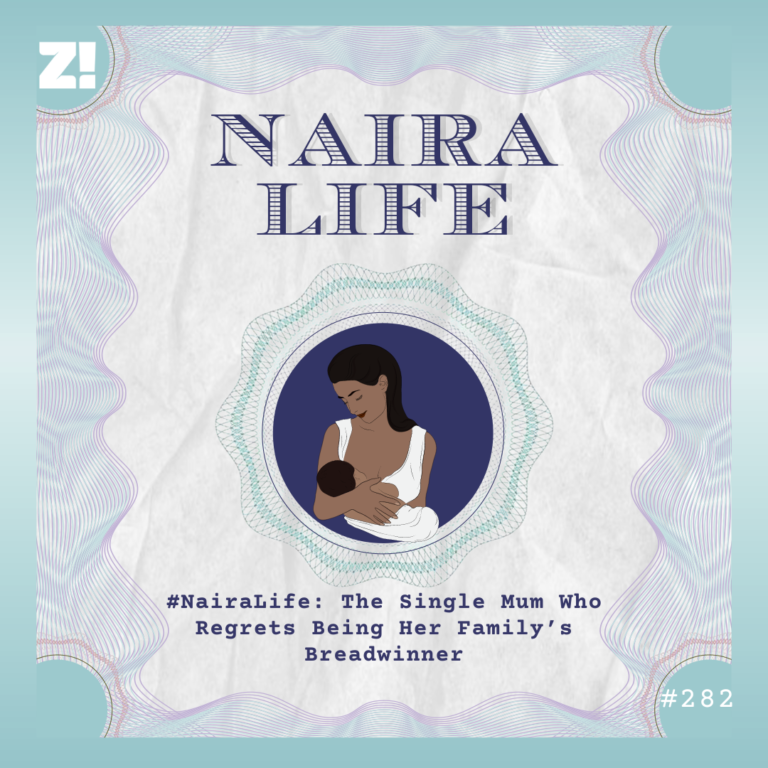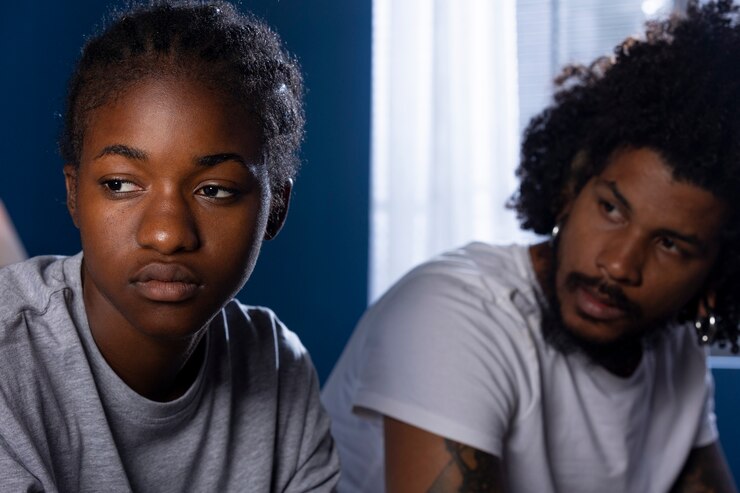Every week, Zikoko seeks to understand how people move the Naira in and out of their lives. Some stories will be struggle-ish, others will be bougie. All the time, it’ll be revealing.
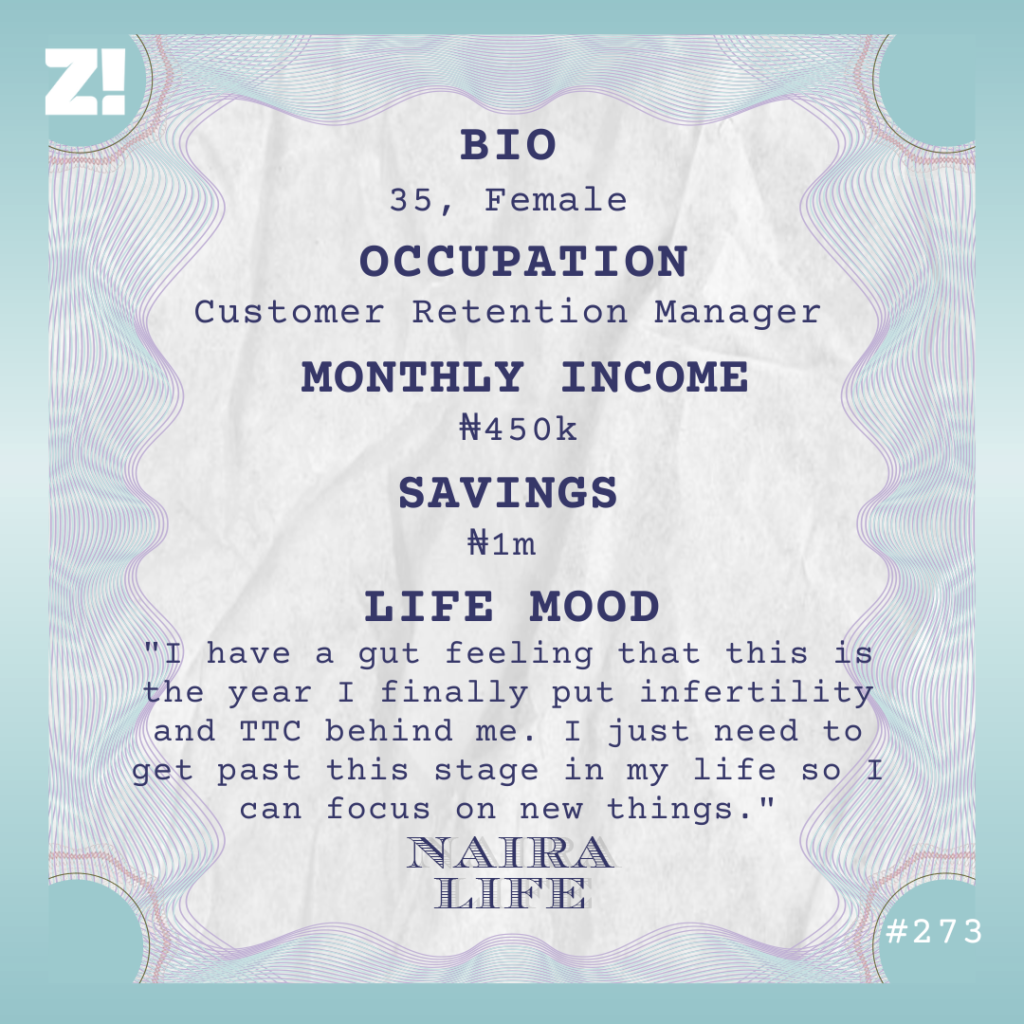
When did you first realise the importance of money?
I have vague memories of my parents telling me I couldn’t go on an excursion in primary school because there was no money. I didn’t understand it. All my classmates were going; what do you mean there’s no money?
But the first time I really understood how much money can change your plans and affect your life was when I was preparing for my wedding in 2011. Before then, I didn’t have to think about money. My own was to collect money from my parents and go to school.
What happened during wedding prep that made you come to that realisation?
I was 22, unemployed and fresh out of NYSC, but somehow, I thought my husband and I would be able to afford my dream outdoor wedding and a one-week honeymoon in the Maldives. We did the outdoor wedding — it cost a little over ₦1m, but the Maldives trip would’ve cost us between ₦3m – ₦4m, which we didn’t have.
It’s not like the money wasn’t there. My husband has a thriving electronics business, but we had to prioritise everything on a scale of preference. We were planning a wedding, had to rent and furnish an apartment, and all the other expenses that come with starting a new home.
This was my introduction to financial responsibility. Things don’t just happen; money makes things happen, and sometimes you have to sacrifice a few things to afford something else.
That’s true
But I still thought life would be relatively easy. My husband has a traditional “provider” mentality, so I didn’t have to work for money. I just needed to have children and start my stay-at-home mum ministry. But the children didn’t come, and after about 10 months, I grew tired of waiting and visited the hospital to check if anything was wrong.
How did that go?
My worries were confirmed. I had fibroids, which were making pregnancy impossible. I got the diagnosis after I visited a second doctor and insisted on getting tested.
At the first hospital I went to, the doctor told me I was in too much of a hurry and just needed to have more sex. As in, he didn’t try to check anything — he just told me to go home and try more sex for the next six months. Now, I know many TTC mums can relate to having their worries overlooked by doctors in the early stages of infertility, but I didn’t know then, and I thought maybe I was overreacting.
But I still felt in my heart that something was wrong. So, I visited another hospital and got a doctor to listen to me. I paid ₦10k for the consultation, ₦15k for a hormonal profile test and I think ₦3k for a scan. It was the scan that showed the fibroids. The doctor said I needed surgery if I hoped to get pregnant.
How did you feel about that?
I was devastated and relieved at the same time. Devastated because I was scared of surgery, and relieved because it looked like I had found a solution. I told my husband but he was immediately against it. He also thought I was rushing. But I had a reason to rush. He’s eight years older than me, and the only male child in his family. I knew his family would soon start dropping hints.
Surgery was out of the question, so I began looking for alternatives. My mum swore that herbs could shrink the fibroids, and introduced me to a herbal practitioner who claimed to specialise in treating fibroids. This person charged me ₦80k for a herbal concoction that was supposed to shrink it in three months. This was 2012, so you should know ₦80k wasn’t small money. I collected the money from my husband and paid.
Three months passed, and my periods only got heavier. One time, I changed my sanitary pads in a restaurant’s toilet and bled through the new pad within 15 minutes. It was that bad.
Damn. I’m so sorry. Did you complain to the herbal practitioner?
I did. He suggested I wasn’t taking the concoctions as instructed, even though I was sure I followed all his steps. He gave me another concoction — that one cost about ₦20k — and said it was to stabilise my system to reduce the bleeding.
The bleeding reduced, but I started having migraines and dizzy spells. I fainted one time in the kitchen and my husband returned home from work and found me on the floor. He threw all the concoctions away and warned me never to visit the man again.
Did you return to the hospital?
For some reason, I still believed I could treat the fibroids without surgery. Most people I told about the situation either said they knew someone who got pregnant with fibroids or swore they used natural remedies to treat it.
Google became my best friend, and when I read that green tea helped reduce fibroids, I became a green tea ambassador. I drank it so much, I’m sure my pee was green at a point.
In 2013, an aunt introduced me to another herbal practitioner, claiming he was legit because he’d treated a close friend. I convinced my husband and he gave me the ₦45k I needed to start on the herbs. I spent about ₦120k over four months with that guy. I first had to do a herbal detox for a few weeks, then different herbal regimens over different periods. The guy felt legit, though. He kept asking me to do scans so we could observe the fibroids.
Were there improvements?
I grew tired of waiting to find out. I felt like I was doing scans and drinking potions without an end in sight. I’d asked the herbal practitioner several times about how long the treatment would take, and he always said it depended on how my body reacted to the treatments. It was too vague for me.
Also, my husband’s family had started dropping hints about babies. My mother-in-law had started calling more frequently to pray for me. Everyone knows that’s code for “Where are the grandchildren?”
I convinced my husband to agree to the surgery, and I did a myomectomy in early 2014. The operation, including some preliminary tests, cost about ₦200k.
What was recovery like?
It took me about two months to feel like myself again. I also had to wait at least four months before trying to conceive again. During the wait, I started sending out job applications as a joke. I was trying to keep myself occupied, and I figured the highest I’d get was a few interviews.
Surprisingly, I got a ₦80k/month front desk officer role at a logistics firm. The job proved to be a lifeline because it was the only thing that kept me sane when 2015 and 2016 passed, and I didn’t get pregnant.
Now, I was properly worried. The fibroids were gone, and I was taking fertility supplements to help with hormonal imbalance every single day, but nothing happened. Funny enough, all while this was happening, my husband hadn’t been tested.
Why, though?
He was busy and almost never went with me to the hospital. Plus, we all just assumed the fibroids were the problem. I changed doctors in 2016 — I wanted a second opinion — and my new doctor insisted that my husband do a semen analysis. To summarise, the chances of my husband naturally fathering a child were low and we needed to consider assisted reproduction — in vitro fertilisation.
Paint a picture of what that looked like
It was a lot of money, and mental and emotional stress. When we started the process in 2016, I quit my job because I didn’t want the stress of commuting and working to affect the procedure.
The process took about three months; they had to keep repeating tests and putting me on drugs to stimulate egg production. There was also the part where I had to inject myself with hormones every day for a week. I think the whole procedure cost us about ₦1.8 million. My husband even had to borrow part of that money because business wasn’t great at the time.
We got two viable embryos from that cycle and decided to transfer both. I was already dreaming of being called “mama twins”. Unfortunately, the embryos didn’t take and the cycle failed.
Oh no
I’ve never cried so much in my life. One thing about infertility is, you don’t know when it ends. You don’t know if a particular cycle is what will change your story, so you keep hoping. But the hope gets dashed again and again, and you have to keep it moving.
I had so much hope for that IVF cycle. I already had embryos! My children were alive, and it looked like my TTC journey was finally ending. But it disappeared again, and I just wanted to die.
It also didn’t help that our families knew we were trying IVF. I stopped picking up calls at a point because the amount of “Sorry. God will do it” I heard that period threatened to drive me insane.
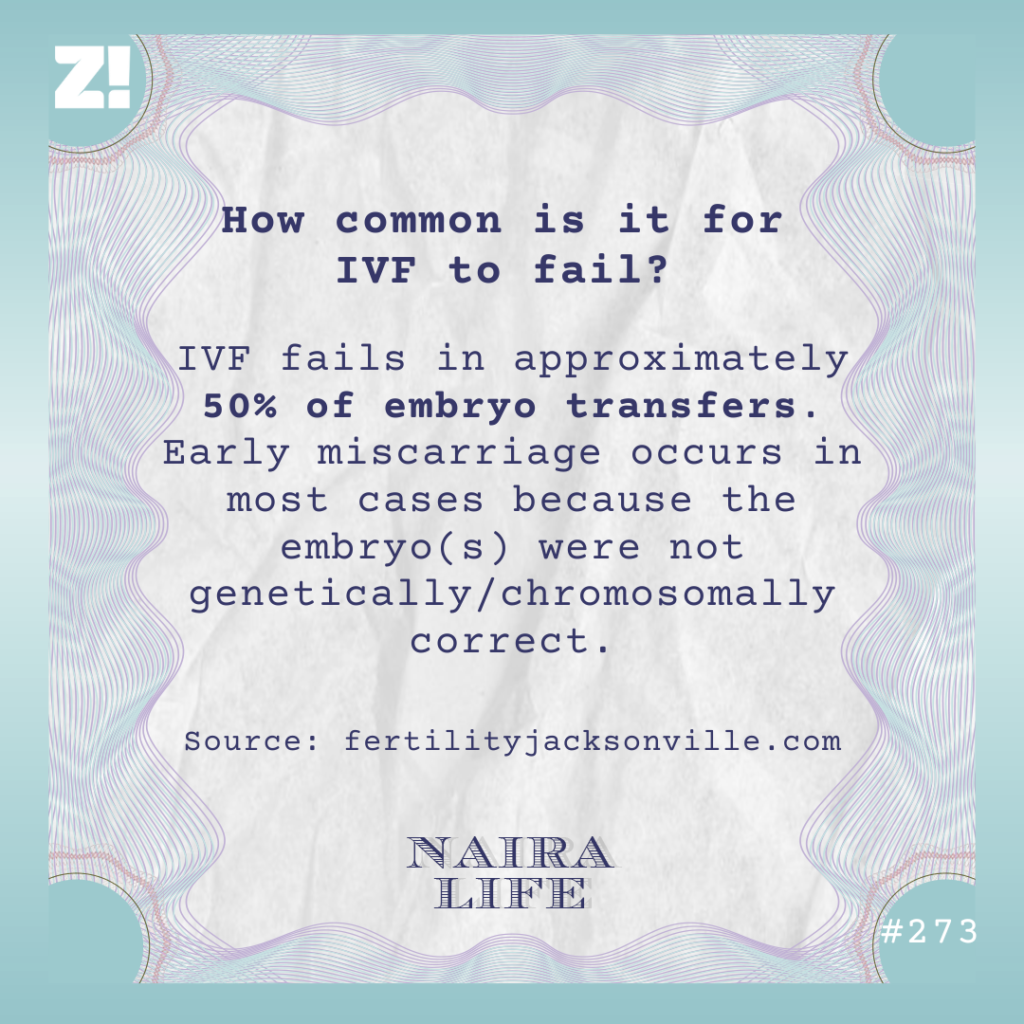
I’m so sorry you went through that
Thank you. I’m not sure how I survived that period; the days were a blur. I just know that in 2017, I decided I needed another job to take my mind off things.
My husband’s friend helped me get a job at a finance company in August 2017. The role was customer retention and it paid ₦180k/month. Most of my salary went into retail therapy. Whenever I felt bad after seeing pictures of pregnant women on Instagram, I’d go to the mall to buy baby clothes and toys so I’d hug them to sleep.
It became a regular thing. I’d buy baby stuff, and when they began to pile up in the house, my husband would complain, and I’d give them out. Whenever I felt sad again, I’d buy more stuff. It was the only way I could cope.
In 2020, I tried another IVF cycle. That one cost about ₦3m.
How did it go?
I don’t know whether to say it was better than the previous attempt. I got pregnant, then had a miscarriage at the six-week mark. It was heartbreaking. The only thing that saved me from entering another depressive episode was the fact that I got a few more embryos from that cycle. We have them frozen for whenever we want to try again. Preserving each embryo at my clinic costs ₦600k/year.
Have you considered when you’d want to try again?
The plan was to try again in 2022, but we moved to our new house, and I didn’t want to risk doing that while stressing about moving to a new place.
We revisited the conversation in 2023, but I discovered some fibroids had regrown. They weren’t huge, but they posed a slight risk to embryo implantation and had to go. My doctor had already told me that the fibroids could grow back, so while I was disappointed, I just saw it as another hurdle to overcome.
I had another surgery around August. It cost about ₦750k for the procedure, tests and medication. The recovery period was basically the same as last time. I was allowed to work from home for a few months after, so I had time to heal.
I was just about to ask how work was going
Oh. I’m still at the same finance company. I’ve been promoted twice and my salary is now ₦450k. I’d probably earn more if I changed companies, but it’s easier for me to stay. I love the people I work with, and I’m already stressed about the challenges that come with being on a TTC journey to add career progression to my worries.
What are some of these challenges?
Where do I even start? There’s the emotional aspect. I know my hormonal imbalance isn’t the primary reason why we don’t have kids, but it still doesn’t stop me from crying or feeling a sharp pain in my heart when I see a pregnant woman.
There are also external factors. I’ve been married for over 10 years, so everyone knows there’s a problem in the baby-making process. You can’t imagine how often a harmless greeting from me turns into a prayer session. A former church member — we had no prior relationship — walked up to me one time, held my hands and told me she noticed I wasn’t smiling and that I needed to stay strong because infertility isn’t the end of the world.
Ah
It was the audacity for me. I’m part of a few TTC support groups online and when I share these experiences, they say it’s because I’m very friendly and approachable. Maybe I need to start frowning my face everywhere so people think twice about giving me unsolicited advice. But it’s still frowning that made that one show “concern”.
Also, several friends have hidden their pregnancies from me because they didn’t know how I’d feel. But the fact that I’m hurting doesn’t mean I can’t be happy for people. In fact, it hurts worse when I notice they’re avoiding me. Then there are the friends who stop associating with you after they get married because they somehow believe that infertility is communicable.
Really?
You have no idea. I’ve also made some fellow TTC friends who stopped talking to me after they had babies. Maybe they felt I’d be too sad to hear stories about their babies or they just didn’t want to make me uncomfortable.
See, I used to have a bunch of friends from uni. But infertility is lonely, and most people don’t know how to address it or even support their TTC friends, so they avoid you and the friendship suffers. Now, I don’t think I have up to three people I can consider close friends. I’ve made peace with the fact that my husband is my only true best friend.
Is there any pressure from your families?
Not really. My mum’s own is to pray for me daily and ask me to test for pregnancy if I do so much as complain about a headache. My in-laws basically mind their business and offer prayers occasionally. There was one time in the sixth year when my mother-in-law called me to ask if I’d just sit down and watch as the years went by. That hurt me so much — I was running from hospital to hospital and she felt I was “sitting down”. Was I going to magically grow a baby?
She hasn’t said anything along those lines again sha. I think my husband warned her never to interfere. I’m not sure if he had similar talks with his sisters, but no one disturbs me and I’m grateful for that small mercy.
How has infertility shaped your perspective on money?
I’ve learned that saving is very important. I used to spend anyhow, but TTC is expensive and almost impossible without an emergency fund. I save almost 60% of my salary these days just in case there’s a test to do or a new supplement to try. My husband’s business hasn’t been doing so great these days, so I can’t expect him to cover all my medical bills.
But it’s a two-way thing. Money is very important while battling infertility, but it can also feel useless. I’ve done IVF twice, with no baby to show for it. So, money can’t end my suffering. It only makes it better. At least, when I cry small, I can shop for baby clothes to make myself feel better.
What are your typical expenses in a good month?
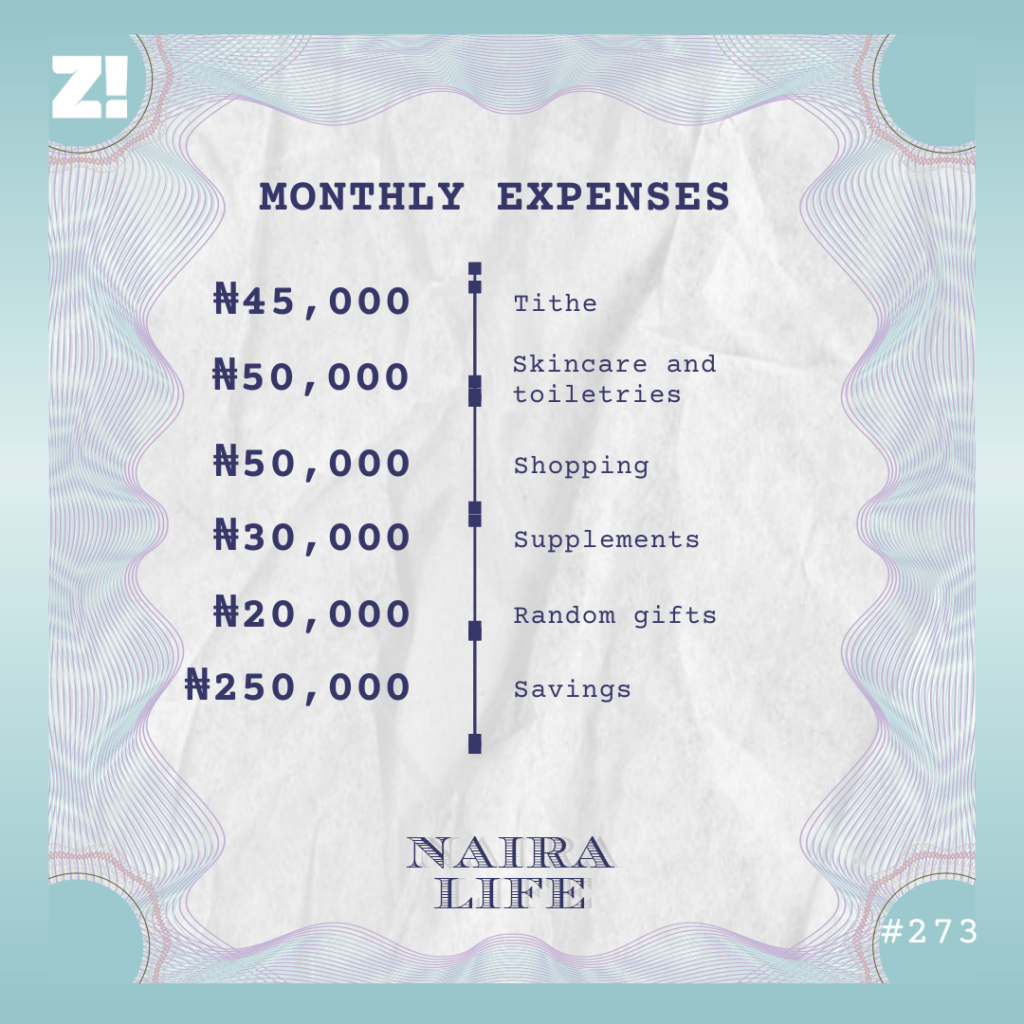
My husband handles the household bills. I have about ₦1m in savings now, and that’s because I now handle most of the medical bills to support my husband. Did I mention he takes supplements too? The doctor said drugs might not necessarily boost sperm levels, but we still try. What if a miracle decides to happen?
Is there something you wish you could be better at financially?
Investments. I don’t know how it works. I can’t do that until I’m done with this TTC business as I can’t afford to tie money down anywhere. But I’m hoping to do an embryo transfer this year. Hopefully, it ends up in a full-term pregnancy. Maybe then I can look into investing my money somewhere.
How would you rate your happiness levels?
6. I have a gut feeling that this is the year I finally put infertility and TTC behind me. I’m trying not to raise my hopes, but hope is the only thing I have. I just need to get past this stage in my life so I can focus on new things.
If you’re interested in talking about your Naira Life story, this is a good place to start.
Find all the past Naira Life stories here.




